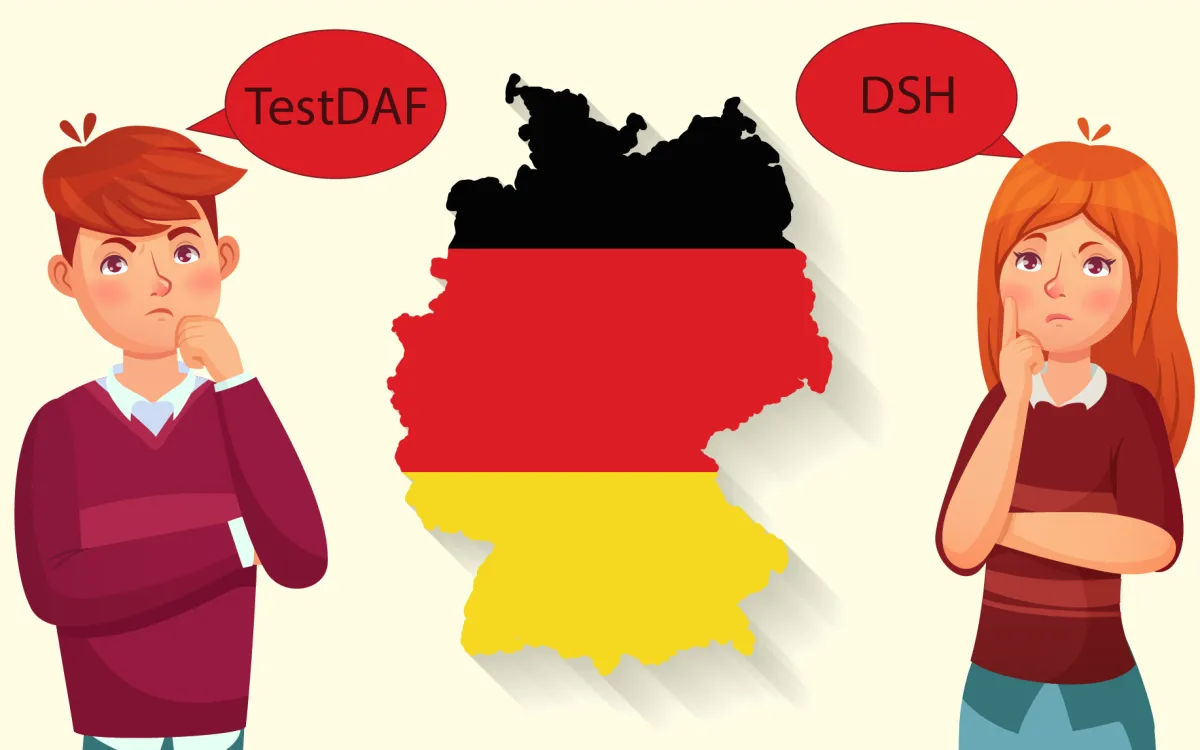If you are planning to study or work in Germany, you will need to prove your proficiency in the German language by taking a language test. Two popular options are TestDAF and DSH. But which one is the right choice for you? In this article, we will compare TestDAF and DSH to help you make an informed decision.
An Overview of TestDAF
TestDAF is a standardized test for assessing German language proficiency of non-native speakers who wish to study or work in German-speaking countries. It is recognized by many universities and employers in Germany, making it a popular choice among individuals seeking to demonstrate their language skills.
The test consists of four sections: reading comprehension, listening comprehension, writing, and speaking. Each section evaluates different language skills and is designed to assess the test taker’s ability to understand and use German in academic and professional settings.
TestDAF scores are categorized into three levels: TDN 3, TDN 4, and TDN 5. TDN 3 indicates an intermediate level of proficiency, TDN 4 represents an advanced level, and TDN 5 means an upper advanced level. The required score may vary depending on the institution or job requirements.
Preparing for TestDAF can be done through self-study using official preparation materials or by attending language courses specifically designed for the test. It is recommended to familiarize oneself with the test format and practice regularly to improve language skills and increase chances of achieving a good score.
Overall, TestDAF serves as a valuable tool for individuals interested in studying or working in Germany by providing a standardized assessment of their German language proficiency. It allows universities and employers to evaluate the language skills of applicants in a fair and objective manner.
Understanding the DSH Examination

The DSH (Deutsche Sprachprüfung für den Hochschulzugang) examination is an important language proficiency test for individuals interested in studying at German universities. It evaluates the German language skills of non-native speakers and assesses their eligibility for university admission.
The DSH examination is designed to assess the ability of candidates to understand and produce academic German at an advanced level. It tests various aspects of language proficiency, including listening, reading, writing, and speaking.
Here are some key points to understand about the DSH examination:
- Test Structure: The DSH examination consists of written and oral components. The written part typically includes tasks such as listening comprehension, reading comprehension, and writing an academic essay. The oral part involves presenting a topic and engaging in a discussion.
- Required Level: The DSH examination usually requires a high level of German proficiency, equivalent to the C1 or C2 level of the Common European Framework of Reference for Languages (CEFR).
- Accepted by Universities: Many German universities recognize the DSH certificate as proof of German language proficiency for admission purposes. However, it’s important to check with individual universities regarding their specific language requirements.
- Preparation: Proper preparation is crucial for success in the DSH examination. It is recommended to take preparatory courses or use study materials and practice tests to familiarize oneself with the test format and improve language skills.
- Alternative Tests: While the DSH examination is widely accepted, some universities also accept other German language tests such as TestDAF (Test Deutsch als Fremdsprache). It is essential to verify the language requirements of the desired university before selecting a specific test.
Overall, understanding the DSH examination is vital for individuals aiming to study at German universities. It is advisable to research and plan accordingly to ensure meeting the language requirements for admission.
Comparing the Structure and Format of Both Tests
When deciding to study or work in Germany, it becomes important to demonstrate your proficiency in the German language. Two popular language tests that assess your German skills are the TestDAF and DSH exams. Understanding the structure and format of these tests can help you make an informed decision about which one to take.
TestDAF
The TestDAF, which stands for Test Deutsch als Fremdsprache (Test of German as a Foreign Language), is widely recognized and accepted by many academic institutions and employers in Germany. It consists of four sections:
- Reading Comprehension: In this section, you will be given texts to read and questions to answer based on your understanding of the content.
- Listening Comprehension: Here, you will listen to audio recordings and answer questions related to the information presented.
- Writing: This section requires you to write a composition on a specific topic within a given time limit.
- Speaking: In the speaking section, you will engage in conversations and give short speeches to demonstrate your oral proficiency.
DSH
The DSH, or Deutsche Sprachprüfung für den Hochschulzugang, is specifically designed for individuals who want to study at German universities. The test evaluates your German language skills in three areas:
- Listening Comprehension: Similar to the TestDAF, the DSH assesses your ability to understand spoken German through audio recordings.
- Reading Comprehension: You will be given academic texts to read and answer questions about their content.
- Writing: The writing section requires you to write an essay or report based on a given topic.
Unlike the TestDAF, the DSH does not have a separate speaking section. Instead, your speaking skills are evaluated through an oral interview during the test.
Choosing the Right Test
The choice between TestDAF and DSH depends on your goals and requirements. If you plan to pursue further academic studies, it is advisable to check with the universities you are interested in to determine which test they require. Some universities may have a preference for one test over the other.
Additionally, consider your own strengths and weaknesses. If you are more confident in your speaking abilities, the TestDAF may be a better fit. On the other hand, if you excel in academic reading and writing, the DSH could be a suitable choice.
Ultimately, both tests assess your German language proficiency, and it is important to thoroughly prepare for either one to achieve the desired results.
Choosing the Right Language Test for Your Academic Goals
When it comes to studying in Germany, language proficiency is a crucial factor. To gain admission to German universities, international students are often required to demonstrate their language skills through standardized tests. Two widely recognized German language tests are TestDAF and DSH.
TestDAF, which stands for Test Deutsch als Fremdsprache (Test of German as a Foreign Language), is a language proficiency exam designed specifically for non-native speakers. It assesses your abilities in reading, listening, writing, and speaking. TestDAF is recognized by most German universities and is suitable for individuals aiming to pursue undergraduate or graduate programs in Germany.
On the other hand, DSH, or Deutsche Sprachprüfung für den Hochschulzugang (German Language University Entrance Examination), is a language test offered by German universities. It measures your language skills in an academic context, focusing on reading comprehension and writing tasks. DSH is generally required for admission to undergraduate studies at German universities and is often preferred by universities for certain programs.
The choice between TestDAF and DSH depends on your academic goals. If you are planning to pursue a degree in Germany and meet the language requirements for undergraduate studies, DSH may be the more appropriate option. However, if you are interested in postgraduate studies or prefer a test that is widely accepted by various institutions, TestDAF can be a suitable choice.
It is important to note that each university may have different language proficiency requirements, so it is essential to research the specific requirements of your desired institution before deciding which test to take. Additionally, taking preparatory courses or hiring a tutor can greatly enhance your chances of success in either test.
In conclusion, choosing the right language test, be it TestDAF or DSH, is crucial for international students aiming to study in Germany. Consider your academic goals and the specific requirements of your desired institution when making your decision. With proper preparation and determination, you can succeed in demonstrating your German language proficiency and embark on a rewarding academic journey in Germany.
Conclusion
Choosing between the TestDAF and DSH exams depends on your specific goals and circumstances. If you are planning to study at a German university, the DSH may be preferred as it is accepted by most institutions. However, if you are looking for more flexibility and the ability to take the exam in various countries, the TestDAF can be a suitable choice. It is important to thoroughly research the requirements of your desired institution or program before deciding which exam to take.
